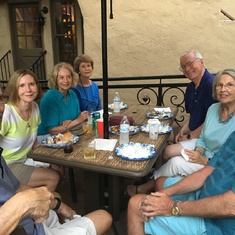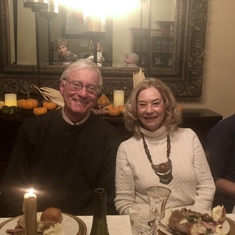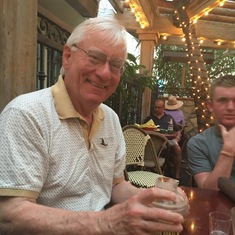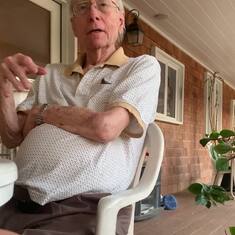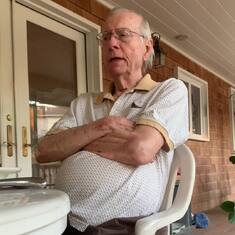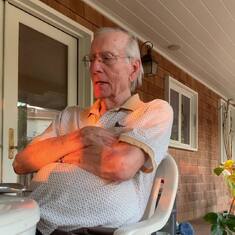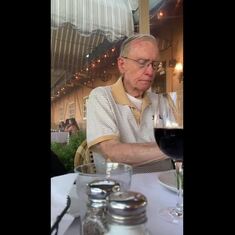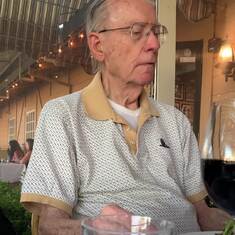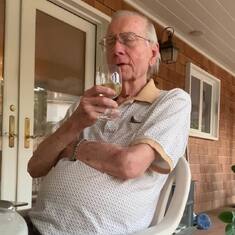“There’s an Indian behind every tree.” So said Everett Jones as he described my new home to be in Midland in far West Texas. Everett was a native of Kentucky, my Dad’s business partner, and known to be a man who enjoyed a good joke. I guess I should have known better than to believe him but I was eight years old and wasn’t too sure what to expect outside of Dallas. And besides, everyone knew that Everett was a war hero, having flown over thirty missions over Germany in his B-24 bomber and lived to tell about it. World War II had ended abruptly five years ago and Everett had decided to embark on another risky line of work, the oil business. He and my Dad were working at the Standard Fryer Drilling Company owned by R.J. Fryer. Dad was moving our family to Midland to run their rigs in the booming Permian Basin oil fields. I knew he was glad to be leaving Dallas because he was more comfortable in the wide open spaces of Texas and not commuting to an office every day.
Everett sensed I was a little nervous about moving to Midland but could not resist one parting piece of advice, “Be careful, Jerry, because everything living in West Texas has horns, thorns, or fangs.” When we were finally approaching Midland after a six hour drive, I immediately knew he had been teasing me about the Indians at least because there were no trees to hide behind. The beautiful oak trees of East Texas had been replaced by scrawny, ugly, mesquite bushes with, sure enough, long thorns.
Midland at some point in time began to call itself “The Tall City.” This was partially due to a few buildings which reached ten or twelve stories but mostly because the landscape was so incredibly flat they could be seen from thirty miles away. It is no wonder that Midland and two of it’s neighbors, Big Spring and Abilene, each had their own air force base because novice military pilots could always find an emergency landing place on the flat terrain of West Texas.
I started school in the middle of the third grade at West Elementary. The other kids had already determined who their friends were and did not quite know whether to admit me into their ranks. Things changed after the first recess period. Play at recess consisted of a tough game of dodgeball. Two teams were picked from the group of potential players and then each player took turns trying to hit one of the opponents standing next to a building wall with a volleyball without the ball being caught. I managed to plunk a few players including their team captain and my status improved immediately.
It is appropriate that a game should have provided me with an easy entry into my new world. I am proud to say that many of those third grade dodgeball players are still friends today. They were my classmates and teammates in flag football, basketball, baseball, track and field and most importantly, high school football.
There must be something in the mineral rich water in West Texas that causes temporary insanity in the citizenry in the fall regarding high school football. Other factors may be an exaggerated sense of town honor in communities with only one high school, the lack of other entertainment, and the frontier spirit passed on by cowboys who enjoyed a good fight. Midland played in a conference with Odessa, San Angelo, Big Spring and Abilene which was nicknamed the little Southwest conference since the winner often went on to win the state championship. After I graduated Odessa started a second high school, Odessa Permian, whose football team became so successful that a book
“Friday Night Lights” was written by H.G. Bissinger about the drive of their team for the state championship. The book led to a movie and a television series that ran for several years.
Midland society was surprisingly sophisticated for a town of around 50,000 in the middle of nowhere. The first residents were some rancher families who had been barely making a living until oil was found in 1923 in the Permian Basin and they became fabulously wealthy. Many residents were highly educated geologists, petroleum engineers, wildcatters, financiers, and bankers. As a result, Midland did develop cultural institutions such as a symphony orchestra, a resident Theatre company, the Museum of the Southwest and an observatory to supplement more traditional activities such as a “World” Championship rodeo and a gaslight era melodrama called the Summer Mummers. One leading oilman, Carleton Beale, even developed a polo competition which must have befuddled the local cowboys tremendously.
The men who were in the oil business, particularly the independent operators, were gamblers and risk takers. One friend of our family,
- C. Williamson, a geologist, lost six million dollars in 1958 to a famous scam artist named Billie Sol Estes. Mr. Estes sold nitrogen fertilizer tanks to investors all over the southwest. The only problem with his business plan was that he was selling the same tanks to different investors over and over again. When the scheme collapsed many expected that J.C might use one of the tall buildings in Midland as a platform to jump to his death but he attended the weekly meeting of the Midland High School Football Booster Club and behaved as if nothing had happened. Within a year J.C. discovered another huge oil field and according to his daughter he never seemed to let his loss bother him.
George H.W. and Barbara Bush caught the “Black Gold” fever and left Yale University and their prominent position in New England society to make it on their own in the “Oil Patch” of West Texas. George took a job in sales at Dresser Industries. The Bush family lived in Odessa, Texas, and briefly in Bakersfield, California, another oil area but in 1950 moved into a small house on Ohio Street in Midland. He soon formed an oil development company with Hugh Liedtke named Zapata Oil. The Bushes lived four blocks away from our home on 1702 Kansas Street.
Everyone who became friends with them including my dad thought they were fine people. George loved baseball and one of his community activities was to coach Pony League baseball. When he was elected the 41st President of the United States, I called my brother and admitted that if your Pony League baseball coach can become President, anybody can.
George W. Bush was the oldest son of George and Barbara. He was born in 1946 and was four years behind me at Sam Houston Elementary and San Jacinto Junior High. The Bush family moved to Houston in 1959 and unfortunately I never knew George. Years later George W. moved back to Midland and became very good friends with my friend from dodgeball days, Charles Younger. Charles was also my roommate at the University of Texas Southwestern Medical School in Dallas and had returned to Midland to practice orthopedic surgery. In 2000 when it became apparent George W. would be the Republican nominee for President many reporters descended on Midland to get some background (i.e. dirt) about George. They couldn’t find anyone to say anything bad about George until finally Charles remarked that everyone thought George was a great guy and a loyal friend but “nobody thought he was smart enough to be President.” That statement was only partially true because when George was elected the 43rd President of the United States he arranged a flight to Washington and tickets to an Inaugural Ball for his friends from Midland, including Charles.
Dad and Mom both loved living in Midland. He became a partner when Standard Fryer Drilling Company became Fryer and Hanson Drilling Company. He was running rigs over a huge territory from Farmington, New Mexico to New Iberia, Louisiana and even in western Pennsylvania. During a trip to Pennsylvania in the winter he almost died when the wings of the company airplane began to accumulate ice which caused the plane to lose altitude. The pilot announced the plane was in danger or crashing unless they could reach some warmer air. Finally the ice began to melt when they were near the ground and they were able to land safely but not before dad promised himself that if he survived he would sell the plane and drive to his drilling locations regardless of how far they were.
A combination of fast cars and straight empty highways allowed him to keep his promise to abandon air travel. He could visit drilling sites 500 miles away in northern New Mexico and return the same day. I realize now that mother must have been worried about his safety during those long trips but he never had an accident. He did take time during his trips to have a little fun. During Easter one year he returned from a small truck stop at Four Corners, New Mexico, with a box labeled Easter Bunny Rabbit. He presented the rabbit to me as a present. I carefully opened the box only to find the only sign it ever held a bunny were some droppings it might have left. Then I found the card that read “Whoops! Looks like he got away!”


